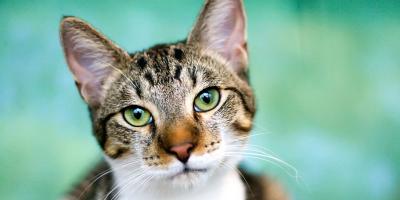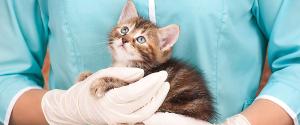
It’s a no-brainer, but your cat must be immunised to protect her from harmful, sometimes fatal, disease.
Before you pick up your new kitten and take it home, make sure that they have had their first vaccination. Kittens should receive they first vaccination between 6 to 8 weeks of age. This first vaccination starts to build your kitten’s defences against any potentially serious diseases.
How do Vaccines work?
Vaccines or vaccinations work by stimulating the animal’s immune system, so that their bodies natural defences are prepared and fully equipped with antibodies to fight against any diseases. Unfortunately if your cat is not properly vaccinated, their bodies’ immune system will not be armed to fight off any virus or bacterial infection.
What is the best Vaccination Schedule?
Kittens surely have a course of three vaccinations, normally given 4 weeks apart:
- 6 – 8 Weeks First Vaccination – Temporary
- 10 – 12 Weeks Booster Vaccination
- 14 – 16 Weeks Final Vaccination
Adult cats require an annual vaccination booster for life. Your vet clinic will send you a reminder a few weeks before your cat is due for their yearly booster.
What do vaccinations protect against?
Cats need to be protected against the below serious and sometime fatal diseases:
Feline Enteritis – This is the most common disease that affects cats. It is a very contagious and is highly life threatening especially in kittens under 12 months of age. The most common symptoms are: High fever, depression, dehydration, severe stomach pain, vomiting diarrhoea and dehydration.
Feline Respiratory Disease (Cat Flu) – Cats of all ages can contract this disease as it is highly contagious. Symptoms of this are sneezing, nasal discharge, runny eyes, coughing, loss of appetite and ulcers on their tongues, in their mouths and on their nose, if left untreated this disease can cause severe dehydration.
Feline Calicivirus – this virus can cause respiratory signs, fever, drooling ulcers of the mouth and footpads, pneumonia, diarrhea, arthritis, and neurologic signs
Feline Distemper or Feline Panleukopenia – this disease are not very common in Australia however vets still see the occasional case, this viral disease is contagious that can cause high fever, vomiting and diarrhoea. Unfortunately it is often fatal in young kittens. It is also important to know that the feline distemper virus is not the same as canine distemper virus.
Feline Chlamydia – Chlamydia is an organism that causes eye disease, it is most commonly seen in young kittens under 9 months of age. The symptoms Chlamydia are discharge from the eyes and nose, sore red eyes, high temperature, coughing, heavy breathing, enlarged lymph nodes, loss of appetite, sudden weight loss and depression.
If your kitten is going to socialise outside we recommend speaking to your vet about a FIV Vaccination. The FIV Vaccination requires a course of 3 vaccinations which are usually given at 10, 12 & 14 weeks of age. Cats being vaccinated for FIV after 6 months will require a blood test prior to being given the vaccination.
FIV (Feline Immunodeficiency Virus) – Whilst FIV cannot be transmitted between cats and humans, it acts in the same way as HIV does in humans, it is a blood borne viral infection that destroys the immune system and leaving a cat susceptible to infections and disease The symptoms of FIV are sores, lesions and diarrhea progress to severe chronic infections as the immune system is overcome. There is no treatment or cure for the virus itself.
Immunizing your cat
As most cats are adequately vaccinated against major infectious diseases, many feline diseases are relatively uncommon. But failing to immunize your cat not only puts her at risk, but also all other cats in your area and even the wild cat population.
All cats must be immunized against the ‘big three’ diseases:
- Feline Infectious Enteritis (FIE), an often-fatal infection of the intestines, causing loss of appetite, fever, vomiting and diarrhea.
- Feline Calcivirus (FCV), a severe virus causing ulcers.
- Feline Rhinotracheitis (FVR), which causes flu-like symptoms.
Together, these three vaccinations are commonly known as ‘flu and enteritis’.
Vaccination is also recommended against the Feline Leukaemia Virus (FeLV), which affects the immune system and is usually fatal.
Vaccinations start at nine weeks, with a second vaccine follow up three to four weeks later. Yearly booster injections are necessary to ensure continuing immunity.
Selecting a Veterinarian for Routine Exams and Insurance Coverage
Your kitten’s veterinarian is your partner in health, helping you take the very best care. You should feel comfortable with the veterinarian’s credentials, her attitude toward your pet’s care, and her ability to have an open dialogue with you. Does she specialize in cats? Ask your friends or neighbours for recommendations, call the local veterinary medical association or check the Yellow Pages for names in your area. Your veterinarian should also have an office and clinic fairly close to your home — in an emergency, you’ll be glad you saved the time. If your veterinarian does not have 24-hour emergency service, keep the name and phone number of one near your telephone.
The Routine Exam
Regular visits to your veterinarian should begin as soon as kitten comes home. They are especially important during your kitten’s first year.
During routine examinations, your veterinarian will check the condition of your kitten’s eyes and ears, listen to the sounds of her heart and breathing, feel her abdomen and coat, and inspect her mouth for disease or tartar. Tests may be required, such as examination of a stool sample for internal parasites, and blood tests to uncover disease (even those that may not be apparent).
Your veterinarian may also recommend preventative external and internal treatment to control and prevent for parasites such as deworming or heartworm.
Pet Insurance
Just as health insurance has become an essential part of our own health care, insurance coverage for pets is an increasingly popular choice for pet owners. Pet insurance is available in a wide variety of coverages and can greatly benefit your cat’s overall health and longevity by allowing for care you may not otherwise be able to provide.
Catastrophic coverage is designed to eliminate many of the tough choices pet owners face when their cat needs surgery or critical care. And coverage for routine care and vaccinations can give the added security of pet wellness. Ask your veterinarian about available pet insurance options.
Related articles



